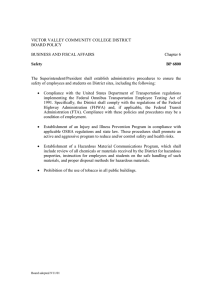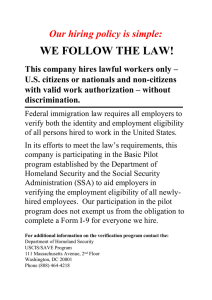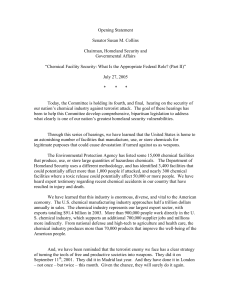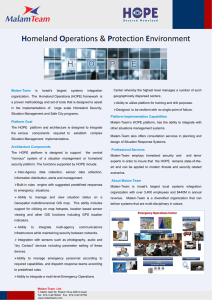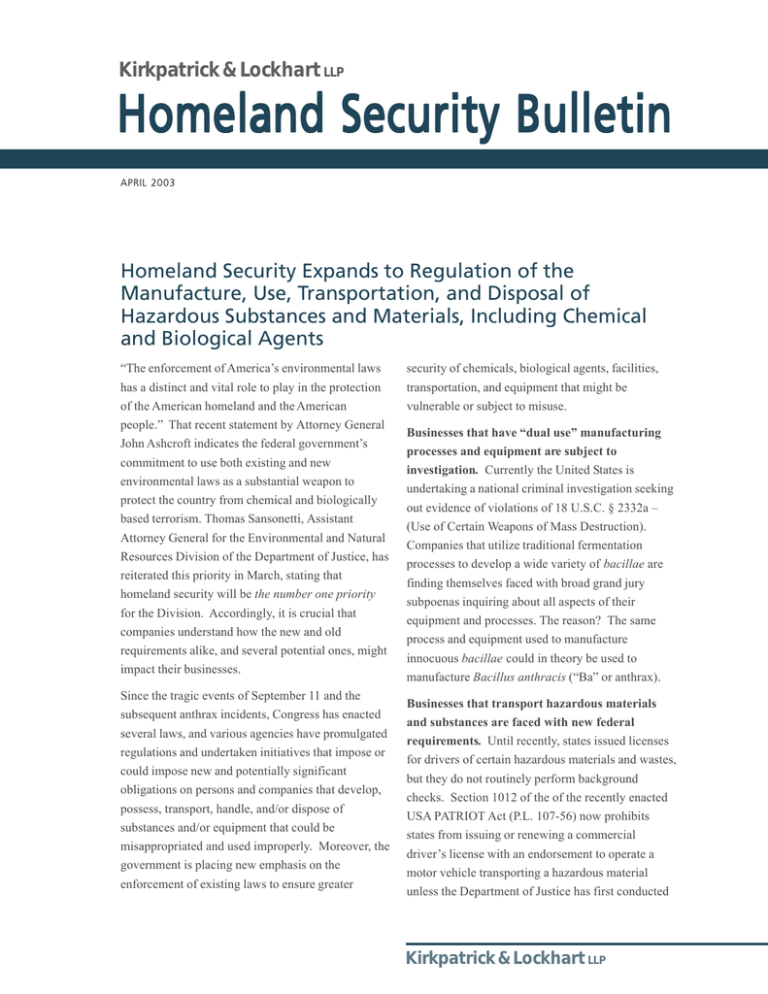
Kirkpatrick & Lockhart LLP
Homeland Security Bulletin
APRIL 2003
Homeland Security Expands to Regulation of the
Manufacture, Use, Transportation, and Disposal of
Hazardous Substances and Materials, Including Chemical
and Biological Agents
“The enforcement of America’s environmental laws
has a distinct and vital role to play in the protection
of the American homeland and the American
people.” That recent statement by Attorney General
John Ashcroft indicates the federal government’s
commitment to use both existing and new
environmental laws as a substantial weapon to
protect the country from chemical and biologically
based terrorism. Thomas Sansonetti, Assistant
Attorney General for the Environmental and Natural
Resources Division of the Department of Justice, has
reiterated this priority in March, stating that
homeland security will be the number one priority
for the Division. Accordingly, it is crucial that
companies understand how the new and old
requirements alike, and several potential ones, might
impact their businesses.
Since the tragic events of September 11 and the
subsequent anthrax incidents, Congress has enacted
several laws, and various agencies have promulgated
regulations and undertaken initiatives that impose or
could impose new and potentially significant
obligations on persons and companies that develop,
possess, transport, handle, and/or dispose of
substances and/or equipment that could be
misappropriated and used improperly. Moreover, the
government is placing new emphasis on the
enforcement of existing laws to ensure greater
security of chemicals, biological agents, facilities,
transportation, and equipment that might be
vulnerable or subject to misuse.
Businesses that have “dual use” manufacturing
processes and equipment are subject to
investigation. Currently the United States is
undertaking a national criminal investigation seeking
out evidence of violations of 18 U.S.C. § 2332a –
(Use of Certain Weapons of Mass Destruction).
Companies that utilize traditional fermentation
processes to develop a wide variety of bacillae are
finding themselves faced with broad grand jury
subpoenas inquiring about all aspects of their
equipment and processes. The reason? The same
process and equipment used to manufacture
innocuous bacillae could in theory be used to
manufacture Bacillus anthracis (“Ba” or anthrax).
Businesses that transport hazardous materials
and substances are faced with new federal
requirements. Until recently, states issued licenses
for drivers of certain hazardous materials and wastes,
but they do not routinely perform background
checks. Section 1012 of the of the recently enacted
USA PATRIOT Act (P.L. 107-56) now prohibits
states from issuing or renewing a commercial
driver’s license with an endorsement to operate a
motor vehicle transporting a hazardous material
unless the Department of Justice has first conducted
Kirkpatrick & Lockhart LLP
Homeland Security Bulletin
a background check on the applicant, and the
Department of Transportation has determined, based
upon that investigation, that the applicant does not
pose a security risk warranting denial of the license.
The newly established Transportation Security
Agency assumed major responsibility for the aspects
of the rule related to assessing security risks. DOT’s
Federal Motor Carrier Safety Administration is about
to issue an interim final rule directing the states not
to issue an endorsement unless the applicant has
received a security clearance from the federal agency
responsible for such clearances. This is but one
example of the federal government’s increased
scrutiny of the transportation of hazardous materials.
Any hazardous material transporter found utilizing a
driver who had not undergone the required
background check could be subject to severe
penalties. (See 68 Fed. Reg. 15381.)
The DOJ’s Environmental and Natural Resources
Division has requested funding for 2004 to create a
unit dedicated to prosecutions and litigations related
to the security of hazardous materials. Assistant
Attorney General Sansonetti stated: “The hazmat
initiative is part of the effort to help the Department
of Homeland Security do its job.” The initiative will
focus on chemical plant security and hazardous
materials transportation. The unit will also
investigate oil and gas pipeline security and
maintenance. The unit will coordinate with local,
state, and other federal agencies, such as the
Department of Transportation and the Environmental
Protection Agency.
Businesses responsible for the proper disposal of
hazardous wastes may be targeted. In United
States v. Konopka, No. 02CR224 (N.D. Ill. Mar. 13,
2003) the defendant was convicted in Illinois for the
unlawful possession of sodium cyanide and
potassium cyanide in violation of 18 U.S.C. § 229(a)(1)
– (Possession of a Chemical Weapon not intended for
a peaceful purpose). According to a plea agreement,
the defendant obtained the chemicals from an
abandoned warehouse in Chicago and stored them in
2
a nearby subway system. The system was shut down
for many hours in a frantic search for the cyanide.
This person’s conduct will result in many years
behind bars. It is unclear whether the owner(s) or
previous owner(s) of that warehouse will be
investigated for improper disposal (i.e., abandoment)
of hazardous chemicals.
Businesses - particularly those with research
components - having the need to handle certain
specific substances face particularly difficult
provisions. Section 817 of the USA PATRIOT Act
prohibits the possession of any biological agent,
toxin or delivery system of a type or in a quantity
that is not reasonably justified for prophylactic,
protective, bona fide research or other peaceful
purposes. It does not cover biological agents or
toxins that are in their naturally occurring
environment, if the biological agent or toxin has not
been cultivated, collected, or otherwise extracted
from its natural source. The Center for Disease
Control has prepared a list of over thirty viruses,
bacteria, rickettsiae, fungi and toxins that are deemed
to be “select agents.” Examples include toxins
(botulinum and Ricin), Viruses (Eastern Equine
Encephalitis, Ebola, Yellow Fever), and bacteria
(Bacillus Anthracis).
The USA PATRIOT Act also prohibits “restricted
persons” from transporting, shipping, or possessing
select agents. “Restricted persons” are defined to
include individuals under indictment for or convicted
of a crime punishable by imprisonment for more than
1 year, fugitives from justice, unlawful users of
controlled substances, illegal or unlawful aliens in
the United States, individuals adjudicated mentally
defective, individuals who were dishonorably
discharged from the U.S. Armed Services and aliens
who are nationals of countries that are designated as
supporting acts of international terrorism (Cuba,
Iran, Iraq, Libya, North Korea, Sudan, and Syria).
Possessors of “select agents” in violation of the
statute are subject to fines and imprisonment. It is
the employer’s obligation, subject to severe
KIRKPATRICK & LOCKHART LLP HOME SECURITY BULLETIN
penalties, to run appropriate background checks to
fulfill the terms of the statute.
Other laws and current proposals provide the
government with the authority to investigate and take
action with respect to chemicals and biological
LAW
agents. The following are just a few of the most
significant of these laws, initiatives, and assessments,
both enacted and proposed, that companies should be
aware of and understand:
POTENTIAL APPLICABILITY AS PART OF
HOMELAND SECURITY EFFORT
Public Health Security and
Bioterrorism Preparedness and
Response Act of 2002
Establishes measures to protect the food and drug supply, including
the requirement that persons possessing listed agents and toxins for
lawful purposes be registered in a national database, and
administrative detention of food articles suspected of adulteration
which pose serious adverse health consequences. To protect the
water supply, each water system serving more than 3,300 people is
required to assess its vulnerability to a terrorist attack or other
intentional acts meant to substantially disrupt the ability of the
system to provide a safe and reliable supply of drinking water and
prepare an emergency response plan.
Chemical Safety Information, Site
Security and Fuels Regulatory
Relief Act
Requires the Attorney General to assess and report on the
vulnerability of facilities that store certain hazardous agents to
criminal and terrorist activity, current industry practices regarding
site security, and the design and maintenance of safe facilities
effective in detecting, preventing, and minimizing the consequences
of releases caused by such activity. In its initial report, DOJ issued a
12-step vulnerability assessment methodology for chemical plant
security focused primarily on terrorist or criminal activities that
could have a significant national impact or cause releases of
hazardous chemicals that would compromise the integrity of a
facility, contaminate adjoining areas and cause injuries or fatalities
among adjoining populations.
The Department of Homeland
Security’s Information Analysis and
Infrastructure Protection
directorate’s assessment of the
vulnerability of chemical plants
(IAIP chemical site vulnerability
assessment)
The IAIP is also undertaking a similar vulnerability assessment of
the nation’s chemical plants. It is unclear whether the DOJ will
complete its vulnerability assessment since the office responsible for
the assessment has been transferred to the DHS’s Border and
Transportation Security directorate.
Proposed legislation to require
chemical facilities to conduct
vulnerability assessments (one
proposed bill requires
implementation of “inherently safer
technologies”)
APRIL 2003
Requires chemical plants to undertake vulnerability assessments
and seeks voluntary compliance to improve security and abide by
standards established by the American Chemical Council.
Kirkpatrick & Lockhart LLP
Homeland Security Bulletin
In addition, the following laws are receiving renewed
attention as vehicles to help the government in its
Homeland Security efforts:
■
Resource Conservation and Recovery Act
■
Comprehensive Environmental Response,
Compensation, and Liability Act
■
The Safe Drinking Water Act
■
Pipeline Safety Act
Given the breadth and complexity of these laws and
initiatives, it is advisable for companies to undertake
internal reviews to determine both compliance with
these and other environmental laws and to conduct
impact assessments for company operations on a goingforward basis.
utilities, research institutions, and oil and natural gas
transportation industries and are sensitive to the potential
impacts of these new requirements on our clients’
activities. We can assist clients in commenting on
proposed rules, counsel them on compliance with new
regulations, and represent them before the agencies and
in court when necessary to ensure that their views are
heard or their interests are defended. For more
information on this aspect of the practice, please visit the
Homeland Security Practice, Environmental and Natural
Resources, and White Collar Criminal Defense areas on
our website, at www.kl.com.
BARRY M. HARTMAN
bhartman@kl.com
202.778.9338
K&L’s Homeland Security Practice includes attorneys
with the experience and resources to assist clients in
understanding and complying with this developing body
of regulatory requirements. We presently represent a
number of clients in the chemical, academic, water
CHRISTOPHER E. DOMINGUEZ
cdominguez@kl.com
202.778.9404
MARSHA A. SAJER
msajer@kl.com
717.231.5849
For further information regarding this Homeland Security Bulletin,
or our law firm’s Homeland Security practice, please contact:
Boston
Roger C. Zehntner
617.261.3149
rzehntner@kl.com
Dallas
Julie E. Lennon
214.939.4920
jlennon@kl.com
Harrisburg
Craig P. Wilson
717.231.4509
cwilson@kl.com
Los Angeles
David P. Schack
310.552.5061
dschack@kl.com
Miami
Daniel A. Casey
305.539.3324
dcasey@kl.com
Newark
William H. Hyatt, Jr.
973.848.4045
whyatt@kl.com
Brian S. Montag
973.848.4044
bmontag@kl.com
Eric Tunis
973.848.4035
etunis@kl.com
New York
Eva M. Ciko
212.536.3905
eciko@kl.com
Pittsburgh
Thomas J. Smith
412.355.6758
tsmith@kl.com
Mark A. Rush
412.355.8333
mrush@kl.com
San Francisco Robert J. Sherry
415.249.1032
rsherry@kl.com
Washington
Barry M. Hartman
202.778.9338
bhartman@kl.com
Jeffrey B. Ritter
202.778.9396
jritter@kl.com
Dick Thornburgh
202.778.9080
dthornburgh@kl.com
®
Kirkpatrick & Lockhart LLP
Challenge us. ®
www.kl.com
BOSTON
■
DALLAS
■
HARRISBURG
■
LOS ANGELES
■
MIAMI
■
NEWARK
■
NEW YORK
■
PITTSBURGH
■
SAN FRANCISCO
■
WASHINGTON
.........................................................................................................................................................
4
This bulletin is for informational purposes and does not contain or convey legal advice. The information herein
should not be used or relied upon in regard to any particular facts or circumstances without first consulting a lawyer.
KIRKPATRICK
LOCKHART
LLP HOME SECURITY BULLETIN
2003 KIRKPATRICK & LOCKHART
LLP. ALL &RIGHTS
RESERVED.
©


